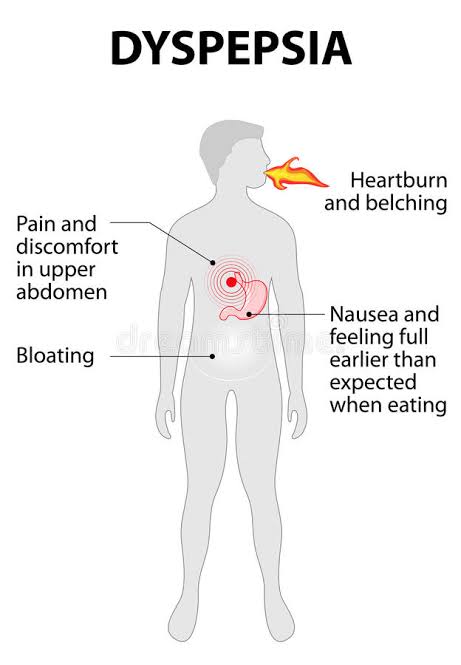Indigestion (dyspepsia) is a very familiar term which means different things to different people. It is sometimes confused with constipation. Constipation is when an individual has difficulty emptying the bowels. Indigestion on the other hand occurs due to abnormality in the digestion of food. It can cause a lot of discomfort with feelings of nausea, bloated sensation and abdominal discomfort.

Indigestion can also present with chest pain in the form of heartburns (heartburns can be a symptom for other abdominal disease like GERD, so visit your doctor in the case of persistent heartburns). Indigestion can occur as a result of many factors related to diet and lifestyle. Indigestion is not a disease but it can be a symptom of a health condition especially when persistent.
Other symptoms of indigestion include;
• Easy satiety feeling full after little or no food)
• Abdominal distension
• Nausea and/or vomiting
• Repeated belching
• Increased passage of gas (farting)
Indigestion can occur at any age and gender. As earlier stated it is caused by several factors which can be basically grouped into three main categories; lifestyle, medications and health conditions.
The following habits can increase your risk of having indigestion
• Eating too fast
• Eating too much (especially late at night)
• Excessive alcohol intake
• Smoking
• Excessive consumption of fatty food
• Emotional disorders like anxiety and depression
Some drugs can irritate the stomach as a side effect and thereby cause indigestion e.g.
• Painkillers like ibuprofen and aspirin
• Oral contraceptives
• Antibiotics
Indigestion can occur as a symptom of the following health conditions
• Gastroesophageal reflux disease (GERD)
• Gastroparesis ( a condition especially in diabetic patients that causes delayed emptying of the stomach)
• Peptic ulcer disease
• Irritable bowel syndrome ( a condition that causes the nerves and muscles of the intestines to be oversensitive)
• Thyroid disease
• Inflammation of the pancreas ( pancreatitis)
• Stomach cancer
• Celiac disease ( an autoimmune condition whereby the small intestine is sensitive to gluten, thereby causing failure of food to digest properly)
• Gallstones

Indigestion also occurs frequently in pregnancy. It could be due to physical changes as the enlarged womb presses against your stomach and also hormonal changes as gastrointestinal motility is reduced by increasing progesterone levels. Consult your obstetrician before taking any medication for indigestion in pregnancy.
Indigestion occurs commonly in babies too. This is due to their developing digestive system. Indigestion in babies is usually not due to any underlying disease, as previously stated, their digestive system is still developing and it usually stops as they age. Common symptoms of indigestion in babies are hiccups, vomiting, irritability (prolonged crying), and reduced appetite. Another Common cause of indigestion in babies is overfeeding.
Indigestion in older children
Indigestion can also occur in late childhood. Common causes include the developing digestive system, lactose intolerance which is a condition characterized by the inability to digest lactose (a compound found in dairy products like milk). Other causes include excessive consumption of carbonated drinks, being overweight, playing while eating, eating too fast and eating excessively spicy and oily foods. Children with indigestion may complain of abdominal discomfort, nausea or vomiting, loss of appetite or bloating.
Are there any preventive measures you could take?
Of course there are. The preventive measures discussed here are applicable to both adults and children that have started taking solid foods (or more specifically children above the age of one year).
– Don’t rush food. Always take your time to properly chew your food before swallowing. And if you are someone with a busy schedule who has to rush their meals, then always try to plan your meals in advance. And for kids, especially active/ playful kids, they like rushing their food so they can go to play. Teach such children proper table manners and make sure they chew their food properly.
– Don’t eat heavy meals before going to bed
– Do not lie down or sleep immediately after eating
– Reduce consumption of excessively greasy or starchy foods especially at night.
– Cut back on alcohol consumption as alcohol can irritate the lining of the stomach and also delay the emptying of digested food from the stomach into the intestine
– Do not exercise with a full stomach as this can cause the stomach contents to reflux back into the esophagus
– Stress, both physical and emotional can interfere with your digestive system. So know your stress triggers! Avoid them and learn various methods on how to manage stress
– Quit smoking. Smoking can also irritate the lining of the stomach
– Cut back on or avoid food and drinks that are acidic like carbonated drinks
Also, for babies, it is advisable to practice exclusive breastfeeding for the first six months because along with several other advantages, breast milk also aids digestion in babies.
– Do not force babies to eat, instead feed little portions until adequately fed.
– Rub the back of babies after feeding so that he or she can burp. Burping helps relieve the baby of excess swallowed air and helps their food to settle
– Allow babies rest after feeding. Better still carry the baby in an upright position so that they can relax against you. This will help their food digest faster.
Do you need to see a doctor for indigestion?
Although indigestion can be due to our diet and lifestyle and can be easily prevented by taking certain measures, it could also be a sign of serious underlying health condition. So please visit your doctor if you or your children have the following symptoms
– Indigestion persists over a long period of time
– Excessive and unintentional weight loss
– Constant loss of appetite
– Difficulty in swallowing
– Severe abdominal pain
– Blood in stool and vomit
– Constant vomiting after eating
– Inability to breath properly
– Chest pain
– Pallor.

Oyewole Ibukun is currently a Medical student of Olabisi Onabanjo University. She has a passion for seeking knowledge with a creative, detail oriented and analytical mindset.

